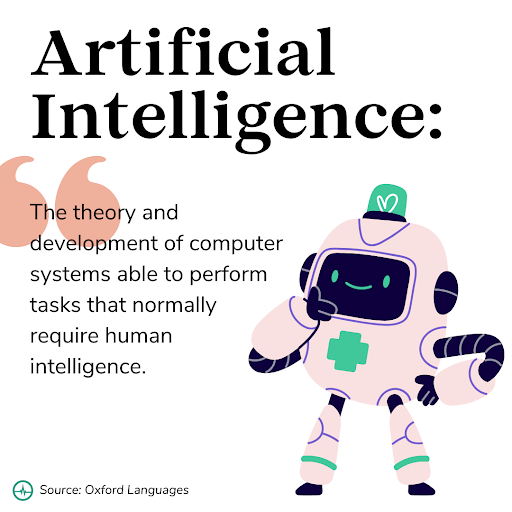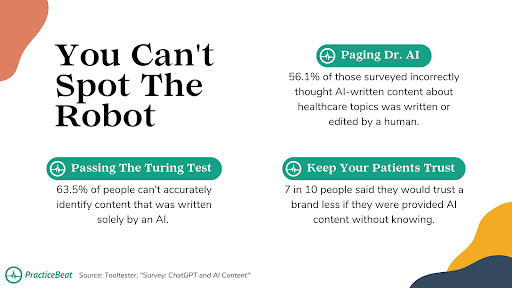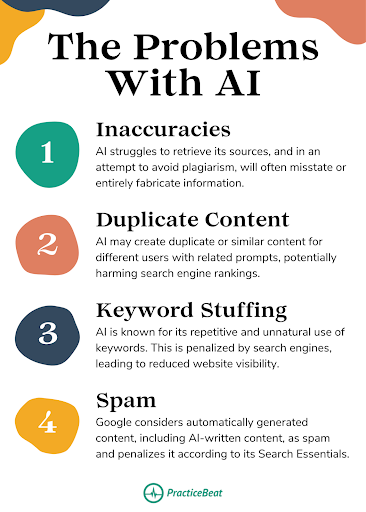Table of Contents:
- How Artificial Intelligence is Transforming the World
- Can AI Replace Content Strategy?
- The Problems With AI
- Frequently Asked Questions

How Artificial Intelligence is Transforming the World
In 1950, English computer scientist Alan Turing published Computing Machinery and Intelligence, a paper that proposed the question, "Can machines think?" Because the ability to think is difficult to measure, Turing proposed a test he called the imitation game, but which would go on to be known as the Turing test. The game would require a human interrogator to ask questions of two others: a computer and another human. If the interrogator was unable to correctly identify which party was which, the computer would win.

It took another six years for the term "artificial intelligence" to be coined, but AI has been a large topic of conversation since. From inspiring global blockbusters like The Terminator and 2001: A Space Odyssey to innovative real-world applications like self-driving cars and facial recognition software, artificial intelligence has become more and more present in our daily lives.
Your patients have been using AI to answer questions and make decisions related to their health for years. Google uses AI to index and understand web pages, interpret search queries, and match those queries to accurate, high-quality results. When a patient looks up their symptoms or a new diagnosis, either via a web browser or their phone's virtual assistant, AI is in charge of curating information and providing them with a list of facts and resources.
However, in recent months, this landscape has changed. Now, patients can ask a question to an AI service like ChatGPT and get a simple answer instantaneously, rather than a list of resources. In the same way that Google Search produces results from its own index of web pages, ChatGPT answers questions with an AI-driven algorithm that has been trained on millions of data points. This can create problems, as your patients may be getting incorrect information that they believe without question.

Despite this issue, artificial intelligence can still be useful to those in the medical field. In fact, you may already be familiar with some of the AI tools that have been developed to help medical professionals with administrative tasks such as tracking patient records, scheduling appointments, creating reports, and more. But when it comes to medical marketing and producing content for a practice's healthcare blog or website, AI content writing tools like ChatGPT can create more problems than solutions.
AI Cannot Replace Content Strategy
AI programs like ChatGPT, also called Large Language Models (LLMs), work by predicting the most likely response to your prompt based on the data it was trained on. In other words, an AI might be able to pass the Turing test and sound like a human, but this is only because it was fed language written by humans, which it has been trained to replicate. This can create a litany of issues, including:
AI Writers are Confident Liars
Because artificial intelligence is not capable of thought, it is also not capable of having an agenda, motive, or intent to deceive. Despite this, LLMs are known to confidently present incorrect information. Peter Lee, a vice president at Microsoft, explained in an interview with USA Today:
"GPT models generally are very bad at information retrieval. It's almost by design because the GPT models don't want to regurgitate their training data. If you're asking it for a specific source, like a reference to a paper, it's not able to resurrect the exact source, so it makes something up—it ‘hallucinates.’"
Let's say you ask an AI to write you a blog post about arthritis, why it happens, and how you can help your patients who have it. A human content writer would find reliable sources, like the CDC, which states that by the year 2040, an estimated 78 million Americans will be diagnosed with arthritis. The AI may have this information from the CDC in its dataset, in an attempt to avoid plagiarism, it might say that only 35 million Americans will be diagnosed with the condition. Without a human writer involved, this information may reach patients without being fact-checked.
AI Plagiarizes and Creates Duplicate Content
The same issue of trying to avoid plagiarism can lead AI content tools to create duplicate content. For example, you might not be the only medical practice asking an AI to write a blog post on arthritis. While the AI won't plagiarize content already available online, it may rewrite that content, in the same way, multiple times, creating duplicate or nearly duplicate content.
Duplicate content will have disastrous consequences for your website's SEO performance, as search engines will penalize you for it. After all, your AI-written blog post on arthritis may have passed an online plagiarism checker initially, but as more and more people turn to AI for content, the chance of duplicate content will only increase.

AI Content Promotes Keyword Stuffing
Keyword stuffing is the overuse of keywords in an attempt to manipulate search engine rankings. Typically, these keywords will be used unnaturally, repetitively, out of context, or appear in a block of text. AI content writers are more prone to keyword stuffing than their human counterparts because they don't have a deep understanding of the subject matter. They will simply determine which keywords appear the most in their training data and repeat them as much as possible.
Google specifically calls out keyword stuffing as a practice that it penalizes. Search engines prioritize their user experience and don't tend to tolerate attempts to manipulate their results. When search engine algorithms detect these patterns, websites are punished with lower search engine result page (SERP) rankings. This means that any early gains you might have seen from the AI content will be negated and your website's organic visibility will suffer.
AI-Generated Content is Spam
Ever since the creation of Google's Webmaster Guidelines, now called Google Search Essentials, automatically generated content has been considered spam. Google’s Search Advocate John Mueller recently said:
"If you’re using machine learning tools to generate your content, it’s essentially the same as if you’re just shuffling words around, or looking up synonyms, or doing the translation tricks that people used to do. [...] It's still automatically generated content, and that means for us, it's still against the Webmaster Guidelines."
This means that if you publish AI content on your website, even if it is free of keyword stuffing, Google will penalize your website with a lower SERP ranking.
In healthcare, where accuracy is a must, AI-generated content can be dangerous. If a patient reads incorrect information on your website, they could make dangerous decisions about their health. This misinformation could also harm your reputation and patient trust, and the low-quality content will leave you low on SERPs. This is why your content strategy needs to involve human experts.
Stay Ahead Of The Curve With Expert Content Marketing
Artificial intelligence and LLMs are still evolving. Though these programs may have potential as helpful tools, they are far from replacing human experts. Medical marketing for doctors is an essential part of running a successful practice, and it should be taken seriously. If your priority is to help reach more patients, increase conversions, and grow your practice, shortcuts like AI-generated content are not the way to go.
Instead, turn to the experts in healthcare marketing. At PracticeBeat, our content writers, SEO experts, web designers, and social media specialists have the knowledge and expertise to boost your practice's visibility. With our human touch, we can help your website remain visible and authoritative in search engine results.
Frequently Asked Questions
What is the importance of content marketing for medical practices?
Strategic content marketing helps your practice reach more patients, establish a stronger online presence, and create more engaging experiences for clients. Content marketing allows you to create content that is specifically tailored towards the needs of your target audience, and can help you build relationships with potential patients. Without it, your medical practice will miss out on the opportunities to make a lasting impression on potential patients.
Is it a good idea to use ChatGPT for content writing?
Simply put, no. If you publish writing that was written by an AI program, search engines will penalize your website with a lower ranking on their result pages. Therefore, it's best to leave all content writing to a human expert in the field. This way, you can be sure that your content is both accurate and compliant with Google's Search Essentials
Who can I talk to about improving my healthcare marketing strategies?
Reach out to the experts at PracticeBeat! Our team of experienced professionals can help you create a comprehensive content strategy tailored to your medical practice's needs. We'll help you develop high-quality content for your website that ranks highly on search engine result pages. Sign up for your free assessment and demo today!
Let PracticeBeat begin by preparing a detailed assessment of the top performers in your market and specialty. We will show how you perform (and why), along with how to outperform the regional competition. Sign up for a free assessment and demo today or visit our website to learn more.

